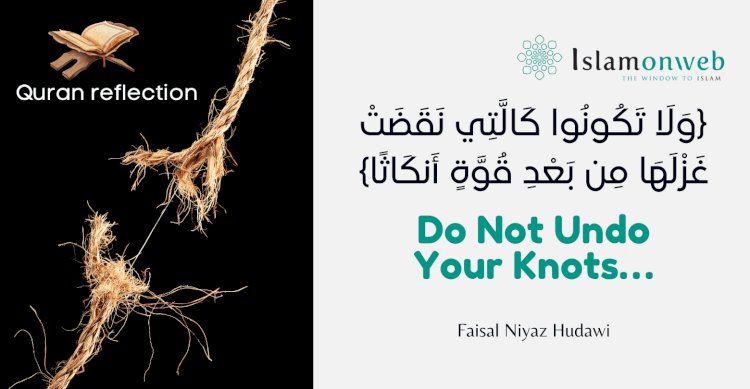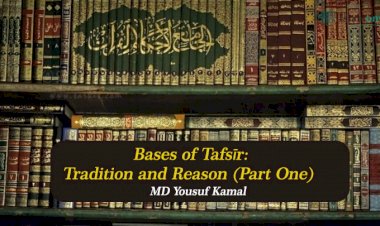{وَلَا تَكُونُوا كَالَّتِي نَقَضَتْ غَزْلَهَا مِن بَعْدِ قُوَّةٍ أَنكَاثًا} | Do Not Undo Your Knots…
{وَلَا تَكُونُوا كَالَّتِي نَقَضَتْ غَزْلَهَا مِن بَعْدِ قُوَّةٍ أَنكَاثًا}
“And do not be like she who untwisted her spun thread after it was strong into untwisted strands…” (An-Naḥl: 92)
As the blessed days of Ramadan pass behind us, and the nights once filled with Qiyām, Qur’ān, and duʿā’ begin to fade into routine, this verse comes as a powerful divine reminder. The image is striking: a woman who, after spinning her thread strong and tight, ruins it with her own hands — turning strength into weakness, effort into loss.
Ramadan was the time we spun our threads with discipline, worship, and nearness to Allah ﷻ. But now, as the structure of the month slips away, the question is: Will we undo what we’ve built? Or will we guard it, strengthen it, and carry it forward?
This powerful verse from Surah An-Naḥl (16:92) warns against undoing one’s righteous efforts, using the example of a woman who painstakingly spins thread — only to unravel it herself. Some scholars, like al-Farrā’, mention that this may have been a real woman in Makkah, known as Rayṭa bint ʿAmr, famously mocked for spinning and then destroying her own work. But many exegetes, like Mujāhid and Qatādah, saw it as a metaphorical warning rather than a reference to a specific person.
The verse was revealed in the context of breaking oaths and covenants for worldly gain — where people used promises and alliances as deceptive tools, breaking them when it no longer served their interests. The phrase "أنكاثًا" refers to threads pulled apart after being tightly wound — a painful waste of effort. And “دَخَلًا” refers to deception or corruption infiltrating something meant to be pure and sincere.
Now, as we reflect after Ramadan, this verse invites us to consider: will we allow inconsistency, laziness, and heedlessness to unravel the spiritual momentum we’ve built? Will we return to old habits and discard the sacred oaths we renewed with our Lord?
The Parable of the Unravelling Woman… And Us After Ramadan
The Qur’ān presents a striking parable — a woman who spends the whole day spinning fine thread with precision and effort. She works tirelessly from morning to evening alongside others, producing something solid, strong, and beautiful. But as soon as the work is complete, she does the unthinkable. She pulls the thread from its root and undoes it all — back to mere fibres, as though nothing had ever been created. She repeats this cycle every day, wasting hours of labour in a moment of mindless self-destruction.
What would we say of such a woman? Surely, we would question her reason, her purpose, and perhaps even her sanity. And yet — if we pause — many of us are not so different.
We pray with devotion in Ramadan, fast with sacrifice, refrain from sin, and fill our nights with duʿāʾ and Qur’ān. Then the moon of Shawwāl rises… and something within us shifts. The one who never missed Fajr in Ramadan suddenly starts missing it again. The person who guarded their tongue returns to idle talk and backbiting. The one who prayed in congregation now struggles even with a single rakʿah.
The truth is — we unravel our spiritual thread just like the woman in the parable. We become "كالتي نقضت غزلها من بعد قوة أنكاثًا" — undoing strength with weakness, dedication with forgetfulness.
But let us remember: our Lord is not seasonal. His mercy does not end with Ramadan. And neither should our resolve. Ramadan was not a destination — it was a launchpad. The thread we spun during it was meant to strengthen us, not be discarded.
So let us hold fast. Let us not return to heedlessness. For the thread of our taqwā is too precious to waste… and the One who watched us in Ramadan is watching still.
Far too often, we fall into the very mistake that Allah warned us about in the verse:
{وَلَا تَكُونُوا كَالَّتِي نَقَضَتْ غَزْلَهَا مِن بَعْدِ قُوَّةٍ أَنكَاثًا}
“Do not be like the one who unravels her thread after it was strong” (An-Naḥl: 92).
The word ankāthan here means tangled and undone threads — a symbol of wasted effort. This verse reminds us: Don’t be like the woman who spends the entire day weaving and spinning thread with strength and skill, only to destroy her work by unravelling it into meaningless fibres.
This parable, sadly, reflects our spiritual state after Ramadan. How often do we strive, restrain ourselves, fast, pray, recite the Qur’an, protect our eyes and tongue, give charity — only to abandon it all as soon as Ramadan ends? The one who resumes sin after Ramadan, who gives up Fajr, who neglects the Qur’an, and slips back into heedlessness — is like the woman who destroys her hard-earned weaving.
Ramadan was not the end goal. It was the training ground.
The real sign of its acceptance lies in how we emerge from it. Do we continue what we started, or do we undo it?
The Prophet ﷺ urged consistency in worship. He said to ʿAbdullāh ibn ʿAmr:
"O ʿAbdullāh! Do not be like so-and-so, who used to pray at night and then gave up praying." (Bukhārī)
And when asked about the most beloved deeds to Allah, the Prophet ﷺ said:
"The most beloved of deeds to Allah are those done consistently, even if small." (Bukhārī)
He ﷺ also said:
"The most beloved of deeds to Allah is that which is consistent, even if it is little." (Muslim)
This is the real fruit of Ramadan — not just the 30 days of effort, but the lasting habits it instils. Ramadan was our spiritual gym — now we must carry the strength into the rest of the year.
Let’s not be seasonal believers. Let us continue praying on time especially Fajr, protecting our speech, giving charity, reciting Qur’an, and standing in prayer — even if less than what we did in Ramadan. Allah doesn’t look for quantity. He loves consistency.
And the Lord of Ramadan is also the Lord of Shawwāl, Dhul-Qaʿdah, and every month that follows.
Disclaimer
The views expressed in this article are the author’s own and do not necessarily mirror Islamonweb’s editorial stance.
























Leave A Comment